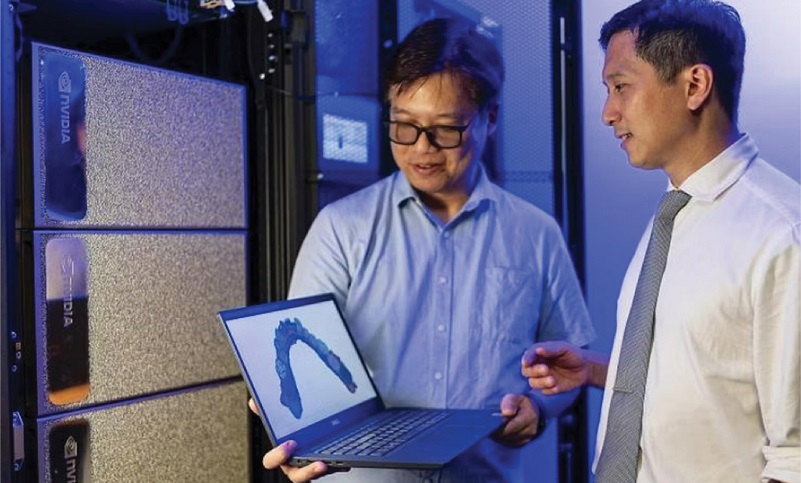With the launch of Singapore's first healthcare supercomputer devoted to medical research, NUH stands on the cusp of transforming innovation into tangible outcomes.
Issue 2 | September 2023

 Subscribe and ensure you don't miss the next issue!
Subscribe and ensure you don't miss the next issue!
In today's digital age, harnessing the power of supercomputers to produce data-driven outcomes continues to be top of mind for many industries - not least healthcare.
Supercomputers, which are tens of thousands of times faster than the average laptop, are uniquely equipped to handle data-intensive applications, including those involving artificial intelligence (AI).
In healthcare, a sector awash with complex data, the ability of AI-based technologies to rapidly sift through and learn from such datasets is indispensable. From precision medicine research to refining medical diagnoses and treatments, AI is becoming an integral part of the healthcare fabric. Its assimilation promises not only enhanced efficiencies but also a healthcare system that is more accurate, accessible, and sustainable.
Prescience: A new dawn for healthcare at NUH
Singapore's healthcare landscape is getting a shot in the arm with the launch of Prescience, the city-state's third national supercomputer, housed at the National University Hospital (NUH). A collaborative brainchild of the National University Health System (NUHS) and the National Supercomputing Centre Singapore, Prescience is dedicated exclusively to healthcare and medical research.
Packing multiple NVIDIA DGX A100 systems - powerful workhorses for AI applications - the supercomputer's focus is to harness medical big data for training large language models (LLMs) tailored to Singapore's healthcare needs. These LLMs, like the NUHS' version of ChatGPT, NUHS Russell-GPT, can swiftly summarise patient case notes and draft referral letters - a boon for busy doctors who can then redirect more time towards patient care.
"The integration of Prescience into our healthcare system is transformative," says Associate Professor Ngiam Kee Yuan, Group Chief Technology Officer at NUHS. "By synthesising local medical knowledge and reducing administrative tasks, we're not only enhancing the work lives of our healthcare professionals but also setting a new gold standard for patient care."
AI in action
Beyond streamlining tedious administrative chores, what else can AI do?
"Generative AI, exemplified by systems like the NUHS Russell-GPT, represents a meaningful new tool that can help unlock vast potential for enhancements in healthcare," says A/Prof Ngiam, who is also the Head & Senior Consultant at the Division of General Surgery (Endocrine & Thyroid Surgery), Department of Surgery at NUH. Delving deeper into the capabilities of Prescience, AI models are poised to bring about transformative changes in patient care for NUH.
One of the most promising applications is in predicting of patient trajectories. By leveraging the power of AI to analyse historical data from a quarter of a million patients, it becomes possible to forecast a patient's healthcare journey. This predictive capability holds practical significance especially when dealing with common conditions like urinary tract infections, or chronic ailments such as stroke and diabetes.
"By predicting the course of a patient's ailment, we can better optimise care levels and resource allocation, ensuring that patients receive the right care at the right time," adds A/Prof Ngiam. "Our team is also actively exploring the usage of AI models in to transform all aspects of healthcare, including clinical, research, education and administration."
Another initiative underpinned by Prescience is the SMILE AI (Smart Monitoring and Intelligent Learning for Enhancing oral health) project, which focuses on enhancing oral healthcare. Within this project, a machine-learning (ML) model creates 3D dental scans, generating digital representations of patients' teeth and their positions in just a few minutes - a process that once took up to an entire day.
Another ML model uses X-rays of the upper and lower jaws, known as dental panoramic tomograms, to predict gum disease. By leveraging these AI capabilities, dentists can provide patients with rapid, comprehensive insights into their oral health, enabling more timely and personalised treatments.
The future of healthcare is not just digital - it's intelligent. With the integration of advanced supercomputers like Prescience into NUH's operational framework, the potential for transformative change in healthcare is immense - particularly as AI models improve and data reservoirs expand. For NUH, this means more precise treatments, efficient resource allocation, and ultimately, an even higher standard of
patient care.
Like this article? Simply subscribe to make sure you don't miss the next issue of EnvisioningHealth!


















